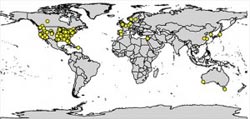Princeton researchers use mobile phones to measure happiness (Demography)

Locations of study subjects on world map (Source: Demography)<br>
In a study involving volunteers who agreed to provide information about their feelings and locations, the researchers found that cell phones can efficiently capture information that is otherwise difficult to record, given today’s on-the-go lifestyle. This is important, according to the researchers, because feelings recorded “in the moment” are likely to be more accurate than feelings jotted down after the fact.
To conduct the study, the team created an application for the Android operating system that documented each person’s location and periodically sent the question, “How happy are you?”
The investigators invited people to download the app, and over a three-week period, collected information from 270 volunteers in 13 countries who were asked to rate their happiness on a scale of 0 to 5. From the information collected, the researchers created and fine-tuned methods that could lead to a better understanding of how our environments influence emotional well-being. The study was published in the June issue of Demography.
The mobile phone method could help overcome some of the limitations that come with surveys conducted at people’s homes, according to the researchers. Census measurements tie people to specific areas — the census tracts in which they live — that are usually not the only areas that people actually frequent.
“People spend a significant amount of time outside their census tracks,” said John Palmer, a graduate student in the Woodrow Wilson School of Public and International Affairs and the paper’s lead author. “If we want to get more precise findings of contextual measurements we need to use techniques like this.”
Palmer teamed up with Thomas Espenshade, professor of sociology emeritus, and Frederic Bartumeus, a specialist in movement ecology at the Center for Advanced Studies of Blanes in Spain, along with Princeton’s Chang Chung, a statistical programmer and data archivist in the Office of Population Research; Necati Ozgencil, a former Professional Specialist at Princeton; and Kathleen Li, who earned her undergraduate degree in computer science from Princeton in 2010, to design the free, open source application for the Android platform that would record participants’ locations at various intervals based on either GPS satellites or cellular tower signals.
Though many of the volunteers lived in the United States, some were in Australia, Canada, China, France, Germany, Israel, Japan, Norway, South Korea, Spain, Sweden and the United Kingdom.
Palmer noted that the team’s focus at this stage was not on generalizable conclusions about the link between environment and happiness, but rather on learning more about the mobile phone’s capabilities for data collection. “I’d be hesitant to try to extend our substantive findings beyond those people who volunteered.” he said.
However, the team did obtain some preliminary results regarding happiness: for example, male subjects tended to describe themselves as less happy when they were further from their homes, whereas females did not demonstrate a particular trend with regards to emotions and distance.
“One of the limitations of the study is that it is not representative of all people,” Palmer said. Participants had to have smartphones and be Internet users. It is also possible that people who were happy were more likely to respond to the survey. However, Palmer said, the study demonstrates the potential for mobile phone research to reach groups of people that may be less accessible by paper surveys or interviews.
Palmer’s doctoral dissertation will expand on this research, and his adviser Marta Tienda, the Maurice P. During Professor in Demographic Studies, said she was excited to see how it will impact the academic community. “His applied research promises to redefine how social scientists understand intergroup relations on many levels,” she said.
This study involved contributions from the Center for Information Technology Policy at Princeton University, with institutional support from the National Institutes of Health Training Grant T32HD07163 and Infrastructure Grant R24HD047879.
Read the abstract.
Palmer, John R. B., Thomas J. Espenshade, Frederic Bartumeus, Chang Y. Chung, Necati Ercan Ozgencil and Kathleen Li. 2013. New Approaches to Human Mobility: Using Mobile Phones for Demographic Research. Demography 50:1105–1128. DOI 10.1007/s13524-012-0175-z
By Tara Thean, Science-Writing Intern, Office of the Dean for Research
Media Contact
More Information:
http://www.princeton.eduAll latest news from the category: Social Sciences
This area deals with the latest developments in the field of empirical and theoretical research as it relates to the structure and function of institutes and systems, their social interdependence and how such systems interact with individual behavior processes.
innovations-report offers informative reports and articles related to the social sciences field including demographic developments, family and career issues, geriatric research, conflict research, generational studies and criminology research.
Newest articles

Innovative 3D printed scaffolds offer new hope for bone healing
Researchers at the Institute for Bioengineering of Catalonia have developed novel 3D printed PLA-CaP scaffolds that promote blood vessel formation, ensuring better healing and regeneration of bone tissue. Bone is…

The surprising role of gut infection in Alzheimer’s disease
ASU- and Banner Alzheimer’s Institute-led study implicates link between a common virus and the disease, which travels from the gut to the brain and may be a target for antiviral…

Molecular gardening: New enzymes discovered for protein modification pruning
How deubiquitinases USP53 and USP54 cleave long polyubiquitin chains and how the former is linked to liver disease in children. Deubiquitinases (DUBs) are enzymes used by cells to trim protein…



